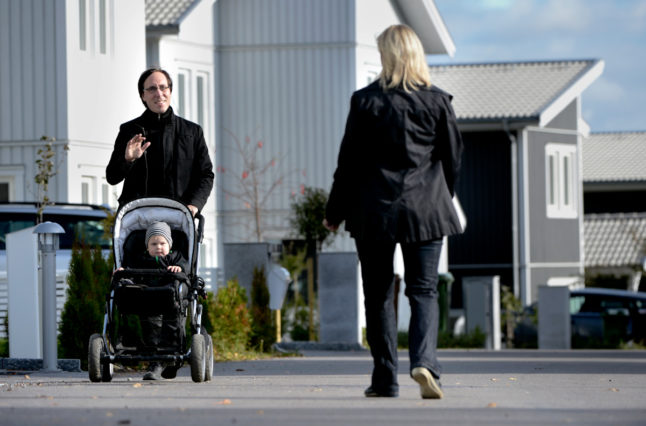1. Take your time and be patient
Swedes can initially be reluctant to form close friendships with neighbours – out of fear, perhaps, that if the friendship sours, it will be socially awkward to have to keep meeting the neighbour every day in the stairwell afterwards.
Also, as there are practically no stay-at-home parents in Sweden and even toddlers are in daycare, most buildings and streets are empty during the day.
This means that the relationships you have, while sometimes friendly, will tend to be limited to short chats in common areas, as you rush in and out to work or on the school run.
When you move somewhere new, start by just by saying hej as you pass neighbours in the stairwell. If a neighbour then asks you if you’ve just moved in, reply politely to their questions, telling them where you’re from and what you’re doing, but without oversharing or getting too personal.
You can ask a few questions in return. But you would not generally invite them around to your house for a meal or drink straight away or expect a similar invitation from them.
This is partly because having an untidy, disordered apartment or house is shameful in Sweden, so people want prior warning before they have visitors so they can show them every room in a ritualised tour.
Children in Sweden are, of course, as eager to play with other children as children from anywhere else, so foreigners with young kids might find they get to know their neighbours more quickly than those who don’t.
Also, understand that some of your neighbours might not be interested in even short chats. If so, don’t pester them. Otherwise, you risk condemning them to a life spent checking you’re not in the stairwell before they dare leave their apartments.
2. Take part in the höststädning and vårstädning cleaning days
Most housing associations in Sweden have collective chore days, normally on a Saturday or Sunday, when the neighbours all come out and tidy up the communal spaces, spending a few hours pruning, weeding, planting, and driving rubbish and broken things to the tip.
It might be höststädning (“autumn cleaning”) or vårstädning (“spring cleaning”). Don’t miss this! Swedes love to bond through doing chores together. It’s all part of the Lutheran work ethic.
It’s at events like this that you’re most likely to deepen your relationship with your neighbours. There will probably be a fika of coffee and cake as well, where you and your neighbours can sit and chat.
Perhaps, more importantly, if you miss it, it will look like you’re not willing to make any efforts towards the collective good, which is never a good thing in Sweden.
3. Get involved in the housing association
Whether it’s a rental housing association (hyresrättsförening), an association for a commonly owned building (bostadsrättsförening), or another kind of neighbourhood association, get involved. It’s a good opportunity to show that you are willing to pull your weight, and an opportunity to get to know a few of your neighbours better.
Until your Swedish is good enough, it’s probably a good idea to avoid being appointed treasurer or chair.
4. Take part in any and all communal social events
As well as chore days, some neighbourhood groups or buildings hold occasional parties, normally in the garden in the summer. This might be a kräftskiva (crayfish party), a barbecue, a fika of coffee and cake, or evening drinks with wine or beer.
Swedes are generally more comfortable with this sort of pre-planned sociability, taking place in a safe, neutral space. If they “know the script”, the potential for embarrassment is less.
Don’t miss these events if they’re happening, because it’s another chance to get to know neighbours a bit better.
When you’re moving in, you will probably have to leave some furniture in a stairwell, or park a trailer or removal van inconveniently in the street. Don’t leave it there too long if you don’t want to make a bad first impression, even if you leave an apologetic note (which you should anyway).
Swedes tend to be very careful about not inconveniencing others or impinging on their lives in any way. And they expect the same level of consideration in return.
This also means not leaving rubbish piled up outside your front door, not leaving a broken bicycle for years in the communal bike shed, or broken child toys in the garden, and not leaving anything in the stairwell, or side of a shared street for more than an hour or so.
Generally, keep in mind that the level or duration of disturbance or mess deemed acceptable in Sweden is lower and shorter than it would be in most other countries.
6. Respect Swedish laundry room etiquette
The Swedish laundry room is legendary for the anonymous angry notes left for those who don’t follow the rules.
But before you condemn Swedes for their passive aggressiveness, it’s worth considering whether such a shared facility would even be possible in your home country.
You should be careful not to take anyone else’s time in the shared laundry room, or to let your own time overrun.
You may think that it does not inconvenience the next person if you finish off your drying while they are putting their clothes in the washing machine. But to Swedish eyes, it does.
If someone has not turned up for their time an hour after it has started, this does not mean you can take their slot.
You should leave the shared laundry room exactly as you found it (and if possible a bit cleaner).
This means:
- cleaning out the fluffy felt from the dryer and putting it in the felt bin
- making sure there are no stones, old plasters, or other detritus left in the washing machines
- sweeping and mopping the floor
- wiping the top of the washing machines so there is no trace of powder
- leaving the doors of the machines slightly ajar so the insides can dry
7. Don’t play loud music or make a lot of noise after 10pm (or perhaps at all!)
As previously mentioned, Swedes try not to impinge on the lives of others and expect not to be impinged on themselves.
Even if you are the world’s best DJ or finest jazz pianist, your neighbours will not take kindly to hearing your inspired mixing or improvising through the walls. This is particularly the case after 10pm (or before 10am for that matter).
It is acceptable to throw occasional parties which can both be loud and go on late, but only on Friday and Saturday nights. If you do this, it’s expected that you warn your neighbours in advance by putting a note through their letterbox, or posting one to the elevator or front door.
You can’t do this very often though. One loud house party a month is too many.
8. Pull your weight when it comes to communal jobs
Even outside of collective chore days, there may remain other communal jobs, such as snow clearing, lawn mowing, autumn leaf disposal, and in some streets and buildings, Christmas tree disposal. If you possibly can, you should make sure you do at least as much of this as your Swedish neighbours.
There might be a lawn-mowing or gardening schedule. If so, you should make sure you do what’s expected of you when it’s your week. If you live in a row of houses, it may very well be expected that if you clear snow from your front door across the garden that you also clear a path all the way to the car park for your neighbours.
9. Ask for and offer help
Despite being very individualistic, Swedes love to help – when asked. It’s very engrained in Swedish culture to help people with things and be useful. Borrowing tools. Giving tips. Even, occasionally, borrowing a rare cooking ingredient.
Anything where they have the capacity to help you, will make them feel useful and also be a great way to break the ice.



 Please whitelist us to continue reading.
Please whitelist us to continue reading.
The last topic didn’t work for me. I asked 2 neighbors to borrow a mixer and they refused.
“If someone has not turned up for their time an hour after it has started, this does not mean you can take their slot.” This is not true. In some parts of Sweden, the rule is that if you’re late just for 5 minutes, your booking time will be transferred to anyone who comes after. In some parts, you’re allowed to be late for 30 minutes.
loved this article. Brings nice and fascinating memories been lived in North and South Sweden. In conclusion, most of the Swedes are beautiful in and out and we need to respect their choice in life. It is our accountability to accept or find other place to live. The fear though with the increase of expat and migrants living and working in Sweden parallel societies can be created that will neve met in solid and comprised grounds that serve Sweden as a whole.